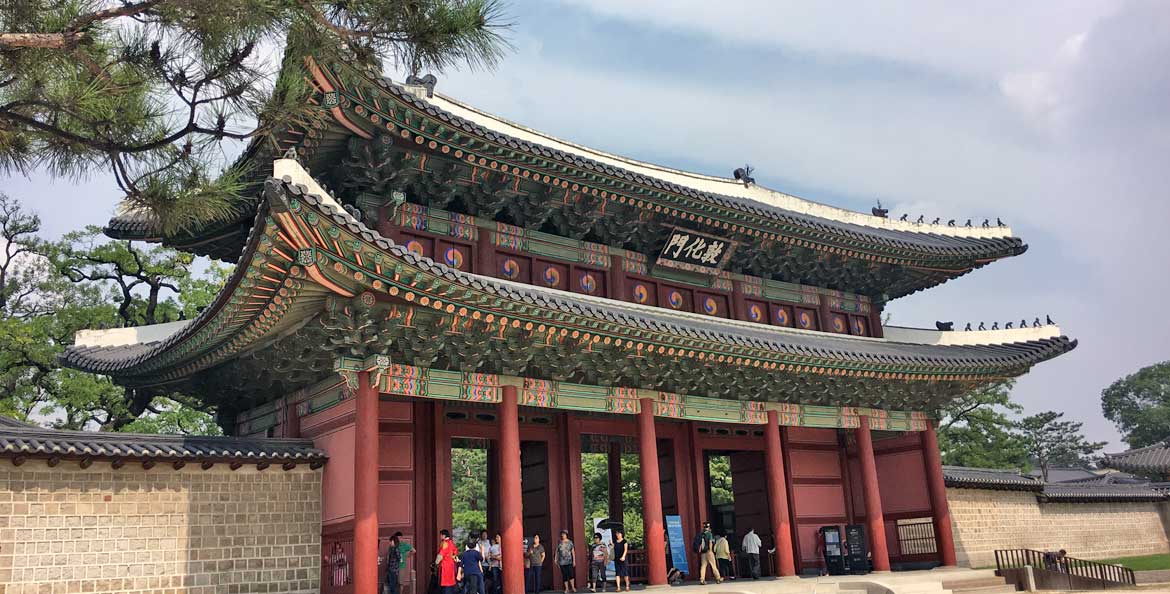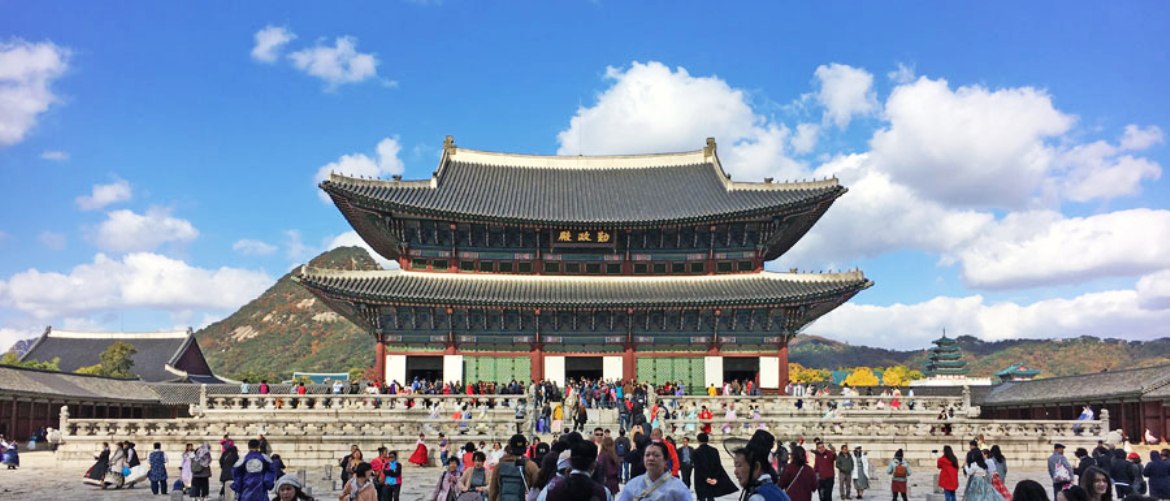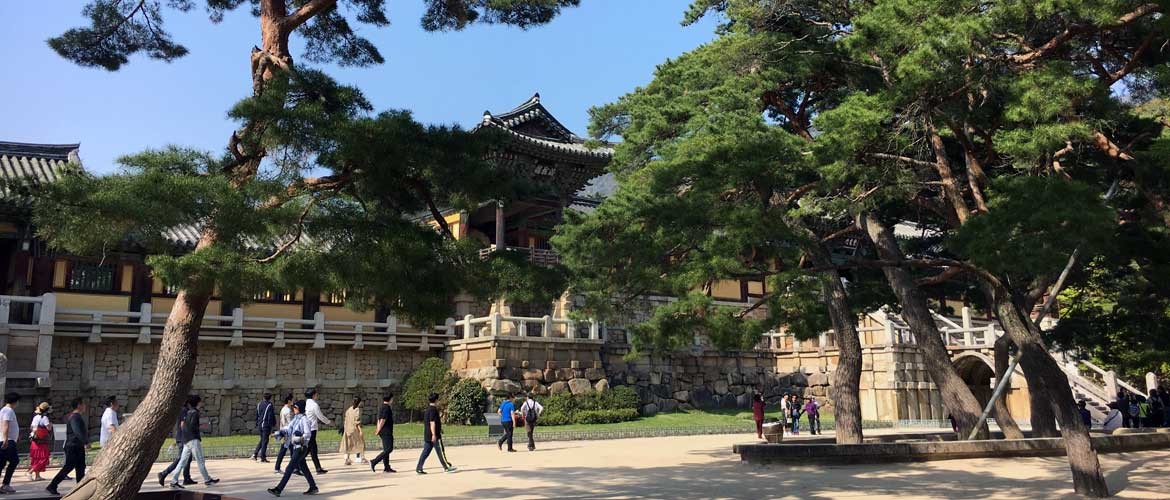One departure only: May 12-21, 2024
Seoul – Jeju Island – Busan – Gyeongju – Seoul
South Korea is famous for its high-tech industries and equally known for its green, hilly countryside dotted with cherry trees and centuries-old Buddhist temples, plus its coastal fishing villages and sub-tropical islands. We invite you to join us on an exciting journey through the Land of Morning Calm!
Important Features
- Small group size (20 maximum)
- Expert professional guides
- Quality local and Western cuisines
- Korean BBQ welcome dinner in high-end restaurant
- Excursion to the Demilitarized Zone near Seoul
Meal Code: B = breakfast / L = lunch / D = dinner
Day 1/Sun: Departing for Seoul
The journey begins with your international flight departing from a city of your choice. International airfare is not included but can be offered on request.
Day 2/Mon: Arrival in Seoul
Upon arrival, transfer to the centrally located hotel on your own, which can be easily done by taxi or airport limousine bus or airport express train.
The 50km cab ride from Incheon International Airport costs between 70,000 and 100,000 Korean Won ($56-$80 US) including expressway toll charge. The Airport Railroad Express train travel between the airport and Seoul Station and costs 9,000 Won ($7 US); from Seoul Station, taking a cab from Seoul Station to the hotel costs just a few dollars. The deluxe limousine bus costing 18,000 won ($14 US) may be an ideal choice depending on your flight schedule.
Day 3/Tue: Seoul (B/L)
Seoul, the capital of South Korea, is a huge metropolis where modern skyscrapers, high-tech subways and pop culture meet Buddhist temples, old palaces and street markets. Notable attractions include futuristic Dongdaemun Design Plaza, a convention hall with curving architecture and a rooftop park; Gyeongbokgung Palace, which once had more than 7,000 rooms; and Jogyesa Temple, site of ancient locust and pine trees.
Our sightseeing today includes Gyeongbokgung Palace, Bukchon Hanok Village (traditional residential area on top of a hill inside the city), National Museum of Korea, and the War Memorial of Korea.
Day 4/Wed: Seoul – Jeju Island(B)
Morning flight to Jeju City, capital of Jeju Island. The 1,849 km² Island in the Korea Strait is famous for beautiful beaches, volcanic landscape of craters and cave-like lava tubes. Hallasan Mountain, a dormant volcano, features hiking trails, a crater lake at the 1,950m summit and nearby Gwaneumsa Temple.
Enjoy a half-day sightseeing that includes the Manjang Cave, Seongsan Ilchulbong, Seongeup folk village, and Sangumburi crater.
Day 5/Thu: Jeju Island (B)
Free day to relax or explore on your own.
Day 6/Fri: Jeju – Busan (B/D)
Free morning. Transfer to the airport for late afternoon flight to Busan (1 hr 10 min). Transfer to the hotel on arrival and have the balance of the day at leisure.
Day 7/Sat: Busan (B/L)
Busan, sometimes spelled as Pusan, is the largest port and second largest city in South Korea with a current population around 3.5 million. The city is known for its beaches, mountains and temples.
Today’s sightseeing begins with a visit to the United Nations Memorial Cemetery. Established in January 1951, the 35-acre burial ground contains 2,300 graves of fallen soldiers who fought on the side of the United Nations during the Korean War (Jun 25, 1950 – Jul 27, 1953). The majority of the interred soldiers were from the Commonwealth of Nations including the United Kingdom (886), Canada (378), Australia (281), New Zealand (34) and South Africa (11). A South Korean guard of honour carries out flag ceremonies daily.
We then proceed to Jagalchi fish market, the largest seafood market in South Korea. Today’s schedule ends with a leisurely walk at Haeundae Beach.
Day 8/Sun: Busan – Gyeongju – Seoul (B/L)
Following breakfast we drive 100 kilometres northeast to Gyeongju. The city was the capital of the 1,000-year-long Silla dynasty and is known for its extensive historical remains.
Our sightseeing in Gyeongju begins at the 8th-century Bulguksa, a magnificent Buddhist temple complex featuring stone pagodas, a series of wooden buildings on raised stone terraces, and a large bronze Buddha. A masterpiece of the golden age of Buddhist art in the Silla kingdom, the temple is classified as Historic and Scenic Site No. 1 by the South Korean government and is also listed by UNESCO as a World Heritage Site.
The Gyeongju National Museum is next on our schedule. The museum houses a large collection of relics from the Silla era giving the visitor a deep insight into the ancient kingdom.
The afternoon train journey to Seoul takes just over 2 hours (KTX #40, 15:07/17:14, 300 km).
Day 9/Mon: Seoul – DMZ – Seoul (B/L)
We spend the morning visiting the Demilitarized Zone (DMZ), with more than half of the designated time spent on driving there and back.
The DMZ divides North Korea and South Korea and is one of the last remnants of the Cold War. The DMZ runs across the Korean Peninsula and roughly follows the 38th parallel north (popular name given to latitude 38° N) on an angle, with the west end of the DMZ lying south of the parallel and the east end lying north of it. With over a million soldiers on watch each day, this stretch of land measuring 250 kilometres (160 miles) long and about 4 kilometres (2.5 miles) wide is the most fortified border in the world.
Free afternoon to explore on your own.
Day 10/Tue: Seoul – Home City (B)
Your memorable South Korea tour ends this morning. Transfer to Incheon International Airport, 50km west of Seoul, on your own. Taxi costs between 70,000 and 100,000 Korean won (US$56 to US$80) including expressway toll charge, but most travellers prefer the Airport Railroad Express which costs 9,500 won (US$7.50) one way per person. The guide will escort you to the train station and assist you with the ticket purchase and getting to the right platform.
| City | Night | Hotel | Category |
| Seoul – 1st stay | 2 | Novotel Ambassador Dongdaemun | luxury/5-star |
| Jeju Island | 2 | The Suites Hotel Jeju | luxury/5-star |
| Busan | 2 | Lotte Hotel Busan | luxury/5-star |
| Seoul – 2nd stay | 2 | Novotel Ambassador Dongdaemun | luxury/5-star |
Dates and Prices
Prices are per person based on double occupancy. See Terms & Conditions for cancellation penalty.
| Depart (Sun) | Return (Tue) | Land Only CA$/US$ |
Single Supplement CA$/US$ |
| 2024 | |||
| 12-May | 21-May | $4,780/$3,450 | $2,230/$1,650 |
|
What the tour price includes:
|
What the tour price excludes:
See Terms & Conditions for more information. |
Passport & Visa
Your passport needs to have at least one blank visa page and six months validity at the end of the tour.
If you are a visitor from Canada, the US, the UK, Australia and New Zealand, you do not need a visa to enter South Korea as long as your stay is within 90 days.
Vaccination
Proof of vaccination against COVID-19 may be required. We will update you on this or any other vaccination requirements around your balance due date.
Travel Health
South Korea enjoys high standards of public health. Tap water is potable. Some locals may boil tap water to get rid of the possible taste of chlorine. Always carry a roll of toilet paper and a bottle of hand sanitizer. In general, public toilets do not provide paper towels for hand drying; many of them have no electric hand dryers either. You may want to carry around a small towel as many locals do. Footwear must be removed when you go indoors at some temples, historical sites and traditional restaurants; it is advisable that you carry one pair of thick socks in your day pack to keep your feet comfortable at such places.
Local Currency & Credit Card
South Korea: won (KRW)
Withdrawing cash from local ATMs after arrival remains our recommended method of currency exchange. Keep your inventory of local currency low. Your tour fare already covers all the expensive items. You only need some cash for incidentals and meals not included in the tour price. Credit cards are widely accepted across South Korea. Use credit card wherever allowed unless your card issuer charges hefty foreign transaction fees.
Travel Insurance – When to Buy
Your deposit will be kept as credit if you cancel for any reason. The transferable credit has no expiration date. Therefore, it may be unnecessary to spend $30 to $50 on cancellation insurance just to protect the deposit.
However, purchase of trip cancellation & emergency medical insurance is strongly advised when your balance is due. If you don’t have proper coverage, the loss can be devastating in case of cancellation before or after commencement of the booked trip or in case of a serious medical emergency during the trip. Please ask us premium quotes when your balance due date is near.




